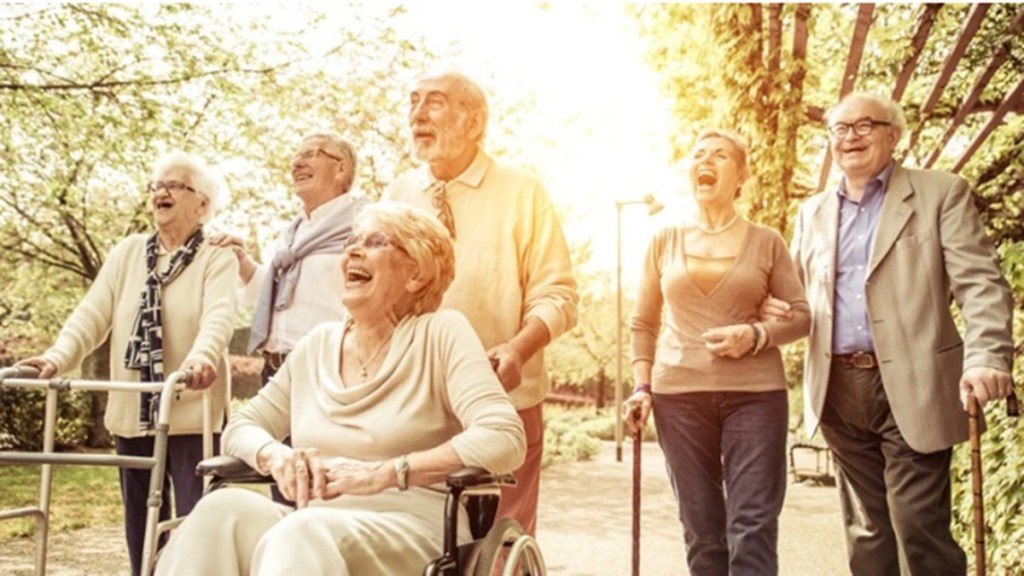People around the world are living longer than ever before. Today, most people can expect to live well into their sixties and beyond. By 2030, one in six people in the world will be aged 60 years or over, as per the World Health Organization (WHO). At this time, the share of the population aged 60 years and over will increase from 1 billion in 2020 to 1.4 billion. By 2050, the world’s population of people aged 60 years and older will double to 2.1 billion. The number of persons aged 80 years or older is expected to triple between 2020 and 2050 to reach 426 million, the WHO adds.
While a rise in the global life expectancy is welcome news, does it necessarily spell out healthier and socially engaged lives with security and dignity? That is where active ageing comes into play. The WHO defines active ageing as “the process of optimising opportunities for physical, social and psychological well-being and active participation in society for all people in line with their needs, goals and capacities as they age”.
Also read: The impact of diabetes on eye health
But how do we ensure that? According to experts, there are many factors that influence active ageing, and these include overall well-being, social engagement, education and learning, access to services and technology, personal engagement and environment.
Quality of life
However, there is no secret recipe to active ageing. When living past the age of 80 years is no longer a rarity, there is a constant need to help older adults maintain quality of life with healthy ageing. The need is to improve various aspects of lifestyle—spending leisure time with family, picking up a passion, travelling, eating well or, at times, focusing on spending.
Dr HP Bharathi, deputy chief medical officer, Jindal Naturecure Institute, Bengaluru, says major life changes become more common with age, including retirement, changing careers, children moving out of the house, losing loved ones, facing physical and health issues, and even losing independence. “The secret to healthy ageing is how we respond to and develop from these changes. One should get active. Exercise helps to maintain strength and agility, improves mental health,” he says.
Eating well is equally important. The key to active ageing is to load up on high-fibre fruits, vegetables and whole grains that make one more energetic. Also, adequate sleep is what you need, as per Bharathi. “As people get older, they report sleep issues. So, it is important to keep the bedroom quiet, dark and cool and avoid artificial light from screens for at least one hour before bed and increase activity levels during the day,” he adds.
Besides, staying connected with friends and family and maintaining the support network, walking with kids or spending time with grandchildren as well as picking up a hobby to maintain brain health and prevent mental decline are important.
Ageing is often perceived as a time of loss in different areas of life. However, responding effectively to ageing goes beyond coping with loss to finding new meaning and joy. While it is important to make peace with the things that cannot be changed, it’s time to look past the limitations that come with age and explore new experiences. This could mean learning a skill, travelling or keeping in touch with the latest technology.
“Building connections with people and being involved in your community can provide a sense of purpose. In the midst of all this, it’s necessary to keep the body and mind active, be it through taking evening walks or trying your hand at the daily crossword. It is possible, at any age, to live life to the fullest,” says Rieak Enok, counselling therapist at The Mood Space, an e-counselling platform founded in 2019 to create a safe and non-judgmental space for individuals seeking mental health therapy.
What’s important is to do things that bring joy. This could include picking up a new hobby or exploring different cultures.
“Engaging in activities that you are passionate about can help to boost your physical and mental well-being. Another important aspect of responding to ageing is to prioritise travel and exploration. Travel has become accessible to many people and provides a great opportunity to broaden your mind and experience different ways of life. Finally, it is important to prioritise nutrition and invest in a healthy diet. Nutrition is also essential for supporting the body’s needs as it ages. Invest in natural, organic and nutrient-rich products to get the vitamins and minerals needed to stay healthy and vibrant. Ageing is all about making the most out of each stage of your life while taking care of yourself,” says Ritika Jayaswal, founder and CEO of Nourish Mantra, an ayurvedic skincare brand.
Also read: Tips for maintaining healthy eyes during pregnancy
In fact, organisations like Seniorworld cater to the needs of seniors with an aim to redefine the lifestyles by making them more independent, engaged, and active. Their senior-friendly services like SilverWings Travel services with holiday packages are specially designed for old like-minded senior citizens. The packages take care of the special needs of senior citizens during travel and allow them to explore places of their choice. One can choose from predefined destinations to join the fixed departures, both domestic and international, or create tailor-made holidays for large groups of people.
Collective effort
While the number of people aged 65 years or older worldwide is projected to more than double, rising from 761 million in 2021 to 1.6 billion in 2050, the world continues to address multiple crises, including the rising cost of living, and the rights and well-being of older persons must be at the centre of collective efforts to achieve a sustainable future, according to the World Social Report 2023.
The report also states that population ageing is a defining global trend. Globally, a baby born in 2021 could expect to live, on average, almost 25 years more than a new-born from 1950, reaching 71 years, with women outliving men by an average of five years. Northern Africa, Western Asia and sub-Saharan Africa are expected to experience the fastest growth in the number of older people over the next three decades, while Europe and Northern America combined now have the highest share of older persons. According to the report, improvements in health and medical therapies, greater access to education and reductions in fertility have driven this transformation.
“Together, we can address today’s inequalities for the benefit of tomorrow’s generations, managing the challenges and capitalising on the opportunities that population ageing brings,” says Li Junhua, United Nations under-secretary general for economic and social affairs.
New research from market research firm Mintel throws some interesting things about working women in India and healthy ageing. As per the study, nearly half (48%) of working women consume vitamins, minerals and supplements (VMS) compared to one-third (33%) of working men. Dr Anamika Banerji, food and drink research analyst, India, Mintel, says, “Mintel consumer data shows that bone health has captured the attention of working women in India. However, data from Mintel Global New Products Database (GNPD) shows there is an opportunity for brands to innovate VMS products that specifically address bone health, as just 14% of VMS products launched in India between November 2021 and October 2022 carried this functional claim.”
Mintel research shows that 42% of working women aged 18-34 years (vs 31% of total sample) agree that consuming VMS is effective in helping them age in a healthy manner. According to Banerji, products offering beauty benefits can communicate how long-term skin and hair health is a part of healthy ageing.
According to a study by US-based interest group AARP and professional services and management consulting firm AON Hewitt, the 50-plus segment of the workforce continues to be the most engaged age cohort across all generations. They demonstrate the emotional and intellectual involvement that motivates employees to do their best work and contribute to an organisation’s success.
However, not everyone has benefited equally from the improvements in health and education that have driven population ageing. If many older persons are in good health or economically active, others live with ailments or in poverty. In more developed regions, public transfer systems, including pensions and health care, provide over two-thirds of the consumption by older persons. However, in less developed regions, older persons tend to work longer and rely more on accumulated assets or family assistance.
Additionally, public spending in most countries has not been sufficient to cover the growing demand for long-term care.
Dr Suversha Khanna, founder and director of Dharamshila Rahat Supportive and Supportive & Palliative Care, New Delhi, finds ageing must not take a toll on mental and physical health.
“All of us believe in enjoying life to the fullest but the process often involves consuming harmful things and keeping physical exercise at bay. No matter what age group you belong to, your health should be your highest priority. Especially if you are an elderly person, a strict routine is a must to eradicate the present and underlying issues in the body. Old age can increase complications and make even the simplest ailments troublesome. Don’t wait till life-threatening diseases lead you to fatal outcomes,” Dr Khanna adds.








